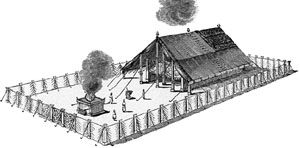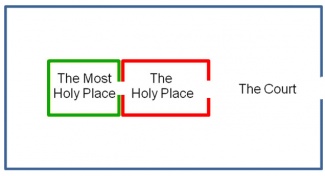William Branham and the nature of God: Difference between revisions
No edit summary |
No edit summary |
||
| Line 12: | Line 12: | ||
|} | |} | ||
'''This article summarizes William Branham's teaching on the Godhead.''' Godhead means “the nature of God”, but is usually a term for “what” God is, rather than “who” God is. At its greatest depth, knowing about someone is much less rewarding that knowing someone. Still, it is a start. | '''This article summarizes William Branham's teaching on the Godhead.''' Godhead means “the nature of God”<ref name="Godhead">The following Greek words are translated into English as '''Godhead''': | ||
{| class="wikitable" | |||
|- | |||
!Greek | |||
!Translation | |||
!Reference | |||
|- valign="top" | |||
|'''Theiotes''', | |||
|Divine nature. (Strongs Greek Lexicon #2305), | |||
|"For the invisible things of him from the creation of the world are clearly seen, being understood by the things that are made, [even] his eternal power and Godhead; so that they are without excuse:" (Romans 1:20) | |||
|- valign="top" | |||
|'''Theios''' | |||
|Divine (Strongs Greek Lexicon #2304) | |||
|"Forasmuch then as we are the offspring of God, we ought not to think that the Godhead is like unto gold, or silver, or stone, graven by art and man's device." (Acts 17:29) | |||
|- valign="top" | |||
|'''Theotes''' | |||
|Deity i.e. the state of being God (Strongs Greek Lexicon #2320) | |||
|"For in him dwelleth all the fulness of the Godhead bodily." (Colossians 2:9) | |||
|- | |||
|} | |||
</ref>, but is usually a term for “what” God is, rather than “who” God is. At its greatest depth, knowing about someone is much less rewarding that knowing someone. Still, it is a start. | |||
Jesus invited his disciples to ''"learn of me"'' (Matthew 11:29), and promised that ''"you shall know the truth, and the truth shall make you free."'' (John 8:32) The scriptures also record that Peter and John, two of Jesus' disciples whose writings form part of the New Testament, were ignorant and unlearned men. (Acts 4:13) So with this invitation to learn, a promise of understanding, and evidence that uneducated people have understood the Godhead in the past, you can believe with confidence that God will give you understanding. | Jesus invited his disciples to ''"learn of me"'' (Matthew 11:29), and promised that ''"you shall know the truth, and the truth shall make you free."'' (John 8:32) The scriptures also record that Peter and John, two of Jesus' disciples whose writings form part of the New Testament, were ignorant and unlearned men. (Acts 4:13) So with this invitation to learn, a promise of understanding, and evidence that uneducated people have understood the Godhead in the past, you can believe with confidence that God will give you understanding. | ||
| Line 129: | Line 149: | ||
When you learn about the design of God’s tabernacle, you are not just learning about the Godhead, you are also learning about God’s plan for Jesus Christ, and God’s plan for your own life. | When you learn about the design of God’s tabernacle, you are not just learning about the Godhead, you are also learning about God’s plan for Jesus Christ, and God’s plan for your own life. | ||
==Footnotes== | |||
<references/> | |||
Revision as of 17:38, 21 January 2012
|
This article summarizes William Branham's teaching on the Godhead. Godhead means “the nature of God”[1], but is usually a term for “what” God is, rather than “who” God is. At its greatest depth, knowing about someone is much less rewarding that knowing someone. Still, it is a start. Jesus invited his disciples to "learn of me" (Matthew 11:29), and promised that "you shall know the truth, and the truth shall make you free." (John 8:32) The scriptures also record that Peter and John, two of Jesus' disciples whose writings form part of the New Testament, were ignorant and unlearned men. (Acts 4:13) So with this invitation to learn, a promise of understanding, and evidence that uneducated people have understood the Godhead in the past, you can believe with confidence that God will give you understanding.
The Tabernacle of the Body
The Bible teaches that Christians are temples of the Holy Spirit. William Branham compared the temple in the Bible to a person, linking your physical body to the temple court, your spirit to the Holy place, and your soul to the Most Holy place. Each fully functioning human being has these three parts, but is one temple of the Holy Spirit.
Some scriptures that support this teaching of the Godhead include:

The order of the Tabernacle
Dividing God into three persons would be like dividing the tabernacle into three temples. Over-unifying God (denying his three-fold being, or saying God is one like your finger) is like having all of the pieces to the tabernacle in one big circle. Both of these ideas are out of order with God’s original design. God’s original design given to Moses was that the Court surrounded The Holy Place, through which the high priest could access the Most Holy Place. In the same way, it is through the sacrifice of Jesus Christ (the Court) that we have access through his Spirit (the Holy Place) to the head of Christ, which is God (the Most Holy Place). Here is a more detailed description of the operation of the tabernacle and its parallel to Jesus Christ: 
The Tabernacle of God is with Men
When you learn about the design of God’s tabernacle, you are not just learning about the Godhead, you are also learning about God’s plan for Jesus Christ, and God’s plan for your own life. Footnotes
|